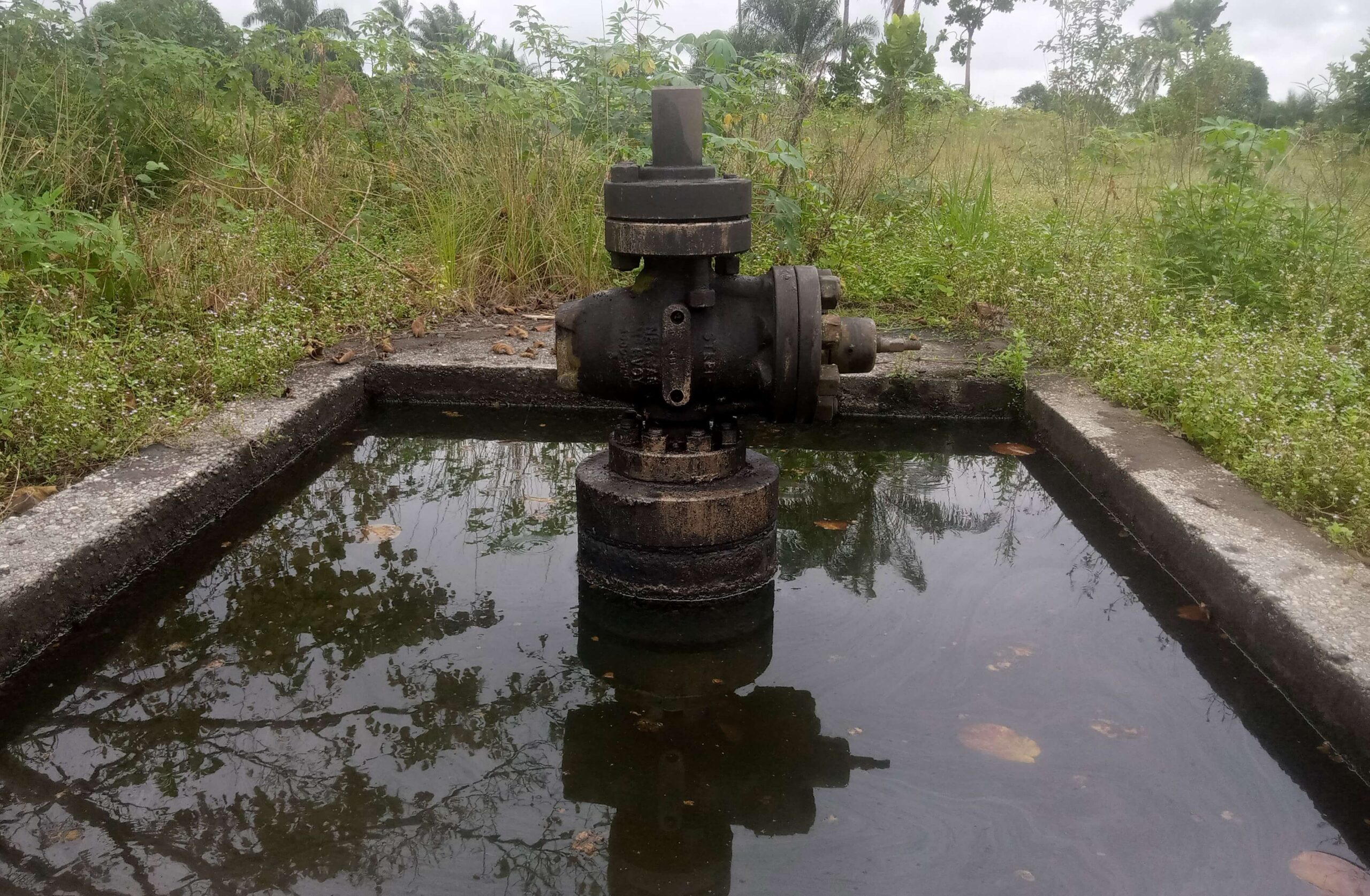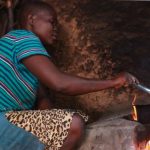OGONI, RIVERS: An equipment failure from an oil facility run by Shell Petroleum Development Company had just occurred one afternoon in July 2022, resulting in an oil spill. It happened in Nonwa, an oil-producing community in Ogoni, an ethnic group in southern Nigeria’s oil-producing Rivers State.
Among the witnesses were farmers, who immediately ran to one 47-year-old Golden Toba at his home in Gio, another rural community in Ogoni. They described the location to Toba, who hurried to the site and identified the pipeline involved.
He then used his smartphone to collect data like geo-referenced time-stamped photographs and physical and biological characteristics of the area.
Next, Toba sent the information to a WhatsApp group whose members included trained community spill monitors, representatives of the National Oil Spill Detection and Response Agency or NOSDRA (Nigeria’s oil spill monitoring agency), and those of Amnesty International and the Centre for Environment, Human Rights and Development or CEHRD – a civil society organisation.
In the group, Toba’s reported data sparked conversation. And soon, members made a joint investigative visit to the site and confirmed the cause to be equipment failure. With the evidence, Shell, the facility operator, was forced to take responsibility, remediating (cleaning) the site and compensating affected farmers after a three-month assessment.
Decades-long conflict
Eight years ago, such a speedy remediation response to oil spills was a near impossibility in Rivers State and eight other states that make up Nigeria’s oil-producing Atlantic coast – the Niger Delta region. Oil spill incidents often resulted in violent conflict between Shell and host communities.
From the moment oil was discovered in Nigeria in the 1950s, oil spillage became a dangerous regular occurrence with grave public health, environmental, and economic consequences for host communities – predominantly farmers and fishers.
Between 2011 and 2022 alone, there were 10,409 spill incidents in the Niger Delta, releasing a combined 464 210 barrels of oil into the environment, according to data from NOSDRA.
Some causes of spills here include equipment failure, sabotage, old and rusty pipelines, well blowouts, and spills resulting from oil theft.
However, two problems always persisted. The first was delays in reporting the actual spill. The second was getting the facility operator to remediate polluted sites and compensate those affected where it is reasonably established that equipment failure, an old rusty pipeline, or negligence on the operator’s part caused it.
Delayed reporting sometimes resulted in arguments and violent conflicts between affected communities and the oil company over the cause and volume of oil spilt.
“There is always that conflict over the timing of the spill,” Nenibarini Zabbey, a professor of biomonitoring and ecology at the University of Port Harcourt, told Prime Progress.
“Lives are lost in some places,” added Toba. “When it is not reported, and it is allowed to [spread], it begins to damage things [and] those whose properties were destroyed get angry.”
One instance involved the first 2008 oil spill in Bodo community in Ogoni. There were controversies over the precise date of the first spill; while the locals said it started on August 28, Shell, the facility operator, said it was October 5.
And while Shell claimed 1,640 barrels of oil were spilled, an independent assessment by US-based Accufacts Inc found that it was between 103,000 and 311,000 barrels. Either way, Shell did not stop the spill until November 7 of that year.
“Shell cannot know what is happening in our domain more than us,” 40-year-old Damian Gbogbara, community-based activist in Bodo, said. “Shell always comes to dispute the date to cause confusion which is one of the ways they bring crisis into the community.”
Ending disputes
In 2015, the Centre for Environment, Human Rights and Development or CEHRD wanted to solve the problem of delayed reporting and response from facility operators, so it initiated a local oil spill-monitoring project.
CEHRD selected 30 vulnerable oil spill communities in Rivers and neighbouring Bayelsa State. After the initial meeting with community leaders, CEHRD enrolled two volunteers (called local monitors) from each selected community for on-the-spot reporting training.
With funding from Amnesty International, CORDAID in the Netherlands, and Dutch Embassy in Nigeria, the volunteers were trained by experts in pipeline monitoring, petroleum regulatory laws, audio-visual data collection, storage and transfer of collected data, and personal safety and security.
After the training, CEHRD provided the local monitors with smartphones and explained how to use their features. With the phones and their GPS cameras, monitors can capture the coordinates of the exact location and scene of the spill and collect other data like geo-referenced time-stamped photographs and physical and biological characteristics of the area.
They then upload the data to a centralised oil spill monitoring and reporting digital platform managed by NOSDRA.
But to ensure NOSDRA takes immediate action, especially pushing for remediation and compensation, CEHRD created a WhatsApp group for local monitors to send the data collected. Stakeholders on the platform include trained monitors, NOSDRA’s zonal directors, CEHRD’s project officer, and representatives from Amnesty International.
“The local monitoring system tends to douse tension in the region, and it helps to give confidence and helps to build capacity. It prevents conflict that usually was the case before the introduction of local oil spill monitoring,” Zabbey, who doubles as CEHRD’s coordinator, said.
“It has contributed to environmental governance and management by the regulators themselves, and it has helped to reduce negligence and educate some locals,” added Meshack Uyi, CEHRD’s environmental governance officer.
‘I feel happy’
Toba was one of the local monitors trained. While NOSDRA has not made public the exact number of cases reported to its centralised platform through the initiative, local monitors say they have reported dozens of cases individually and collectively since 2015. And some of them have led to remediation and compensation.
Toba, for example, said he had filled three oil spill incident reports, the most recent being the July 2022 spill at Nonwa community in Ogoniland that led to almost immediate remediation and compensation payment.
“After reporting the Nonwa incident, I feel happy because there was no conflict between communities and the oil company,” he said with a grin.
But challenges abound, chief of which is that when the spill site is within the operator’s right of way or near a flow station, local monitors are sometimes harassed, threatened, and prevented from accessing the scene by security agents working for oil companies.
“They think the photograph is to file a lawsuit against their principal,” Zabbey said. “[But] what we do is, when there is an opportunity to present some case studies [of harassment] in meetings where we have oil companies, we bring it up.”
Notwithstanding, Toba vowed to continue as a monitor because “Local people are the first contacts of the environment, and they suffer many problems. There must be a mechanism for continuous sensitisation so they can continue to preserve the environment,” he said.
What is new and insightful about this CEHRD-led response is that community youths are now better equipped to monitor and report spills using a tool as simple as a smartphone. It saves time, prevents conflict and, most importantly, leads to remediation and fair compensation to those affected.
This story was produced with the support of Nigeria Health Watch through the Solutions Journalism Network, a nonprofit organisation dedicated to rigorous and compelling reporting.
In July 2022, an equipment failure at Shell Petroleum Development Company in Nonwa, Rivers State, Nigeria, caused an oil spill. Local farmer Golden Toba documented the spill using a smartphone, capturing geo-referenced photographs and site characteristics, and shared the information with a community WhatsApp group comprised of spill monitors and representatives from NOSDRA, Amnesty International, and CEHRD.
Historically, oil spills in the Niger Delta often led to conflicts due to delays in reporting and disagreements on spill details. From 2011 to 2022, there were 10,409 spill incidents releasing vast amounts of oil, causing significant harm to communities. Disputes over reporting timing and cleanup responsibilities traditionally incited violence and mistrust between locals and oil companies.
To address this, CEHRD initiated a local monitoring project in 2015, training volunteers from vulnerable communities to report spills promptly. They provided smartphones for data collection and set up a platform for immediate reporting. This system has helped reduce conflicts, lead to faster remediation, and ensure fair compensation.
Despite the progress, challenges remain, such as harassment of monitors by oil company security. Nonetheless, the initiative has empowered community members to protect their environment effectively and foster better relations between oil companies and affected communities.






